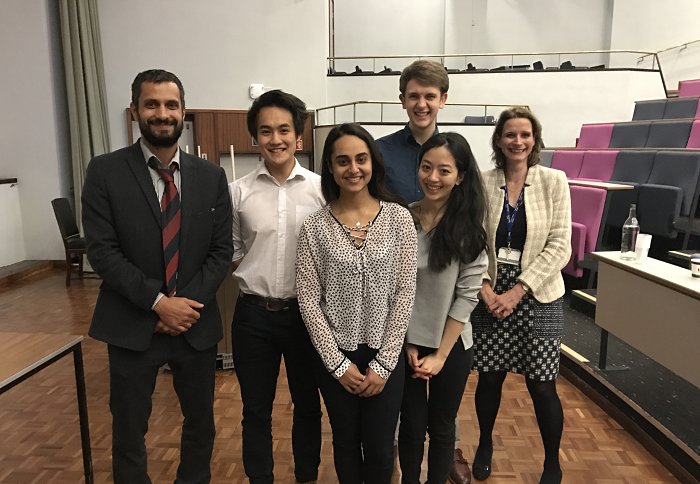Imperial medics awarded for innovation in clinical infection control practices

L-R: Dr Omid Halse, Edward Liu, Roshni Vinda, Benjamin Hayward, Eri Fujitake and Dr Jo Harris
Imperial medical students have been recognised for a successful pilot scheme to reduce the risk of infection from stethoscopes.
Students Eri Fujitake, Benjamin Hayward, Edward Liu and Roshni Vinda’s work involved identifying a simple solution to ensure doctors could easily clean their stethoscopes after each use.
The team’s project, titled ‘Doctors or Vectors: How can we improve stethoscope cleaning practises in hospitals?’ was based at Ealing Hospital. After conducting a survey of clinicians at the site, the students concluded that providing visual reminders and better access to sterile wipes at a ‘cleaning zone’ could result in major improvements to cleaning practises.
The four students’ work was part of the Clinical Quality Improvement project, which is undertaken in the third year of Imperial’s six-year MBBS course. This third clinical year sees medics complete placements in different clinical practises at a variety of sites, where they identify an area that patient safety or efficacy of care could be improved.
At the end of their placement, each team produces a poster detailing their idea and research. Sites choose a winning team and poster to progress to a grand final, held this year at Imperial’s Charing Cross campus, where the teams present their posters to a distinguished panel of judges.
The CQI projects, led by Mr Colin Bicknell, consultant vascular surgeon at St Mary’s Hospital, were judged this year by Dr Jo Harris, deputy head of undergraduate medicine at Imperial’s School of Medicine; Dr Omid Halse, head of Year 3 for the MBBS programme; and Mr Gerry Greyling, head of business development for the Faculty of Medicine.
Looking for innovation, feasibility and overall impact of the idea, the judges presented first prize to the Ealing team.
Dr Harris commented, “We believe it is vital that our medical students learn to engage with Quality Improvement, and the winning project was a simple but effective idea that actively promotes patient safety – everything we were looking for from the project.”
Team member Roshni Vinda added, “We believe the successful outcome of our project was also due to the active involvement of the hospital staff that we approached. No one knows the hospital better than the staff on the wards every day, so their input and cooperation was invaluable!”
The students went on to recommend that infection control was emphasised from an earlier point in doctors’ careers, and that the scheme was implemented more widely in the hospital, due to the mobile nature of a doctor between wards and the need for reliable access to the wipes as they move.
The competition’s second place went to the team from West Middlesex, whose project was titled, ‘An Evaluation of the Accessibility and Quality of Information Provided to Patients on Admission to the Acute Assessment Unit and Acute Medical Units at West Middlesex University Hospital’.
Article text (excluding photos or graphics) © Imperial College London.
Photos and graphics subject to third party copyright used with permission or © Imperial College London.
Reporter
Dorrit Pollard-Davey
Faculty of Medicine Centre